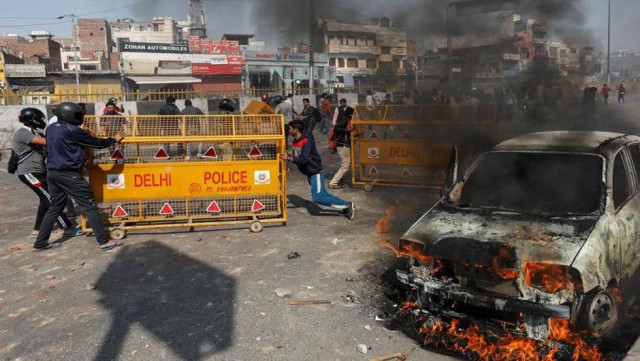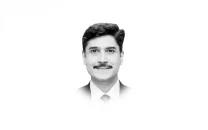When Delhi was bleeding…
The last nail in the coffin of Indian secularism and democracy

Mobs push police barricades during a clash with anti-CAA protesters in New Delhi, February 24. PHOTO: REUTERS/FIle
Delhi bleeding was the last nail in the coffin of Indian secularism and democracy. But while uncovering the mask of democracy from the face of the Modi regime, one can perceive a dangerous and violent scenario is brewing which will further destabilise India in the coming days.
Images of Hindu thugs burning, destroying, looting and vandalising Muslim property in the northeastern parts of Delhi, with the support of the police and state machinery provide enough evidence about the real intentions of the Modi regime. As reported by AFP, BJP leader Parvesh Verma crossed all limits when he threatened Muslims by saying, “protestors could enter your houses and rape and kill your sisters.” No action was taken against Mishra, Verma and other BJP goons for their open insults and threats against the Muslims.
Delhi has a history of being uprooted several times in the last 1,000 years but after the Partition of India, it has witnessed sporadic communal riots. While the majority of Muslims in Delhi migrated to Pakistan, those who were left behind bore the brunt of the Hindu majority. Even then, unlike the communal riots in Moradabad in the 80s, Delhi remained relatively peaceful till the time the city’s Sikh residents became a victim of Hindu mobs who ransacked their property, and raped and killed them in 1984. Mayhem against the Sikh community in Delhi was so large-scale that the newly elected prime minister, Rajiv Gandhi, had to appeal to the people via radio and television to stop the madness. While Delhi’s beleaguered Sikh community reconciled, the Muslim population is now becoming a victim of Hindu fanaticism.
Delhi, which was the seat of Muslim emperors for centuries, is now facing a different situation. BJP goons are threatening Muslims to reconvert to Hinduism, or go to Pakistan or face genocide. Never in the history of India had the Muslim community, the largest minority, felt so vulnerable to Hindu persecution and liquidation. The issue is not only the CAA and the National Register of Citizens (NRC), but it’s the mindset of Hindu nationalists who are in power since 2014, and consider it an opportunity of the century to get rid of the Muslim population once and for all. With this mindset penetrating the state’s vital organs like the police, military, bureaucracy and judiciary, the BJP supporters feel confident and jubilant.
The situation is no better in other parts of India except in the states where BJP lacks majority support. Even in Delhi, the Aam Aadmi Party (AAP) failed to prevent the onslaught against Muslims. Delhi’s Chief Minister Arvind Kejriwal, who won the recent elections with Muslim support, was helpless. His request to the Home Minister, Amit Shah, to call the army order to control the situation was turned down by the central government. Yet, as chief minister, he should have asserted his position and played his role to salvage the besieged Muslim population.
The recent communal violence will have far-reaching implications on the future of India as a state. Will India survive as a democratic and secular state or will it be transformed into a theocratic Hindu state with religious minorities and non-conformist elements silenced? As things stand today, one can figure that three issues will determine the future of democracy and political pluralism in the world’s largest democracy. First, when the instruments of state are taken over by those preaching a particular ideology, a fascist mindset cannot be prevented. For example, when a judge of the Delhi High Court, Justice S Murlidhar, took a position against the failure of the Delhi Police to prevent violence and called to investigate the BJP politicians, he was transferred to another state court in a late night order. That is the reason why the BJP goons were confident of their party’s control over state authorities, thereby proving that not only the police, but the paramilitary also sides with the BJP thugs.
Second, voices raised in favour of Muslims are becoming increasingly vulnerable to attacks by Hindu fanatics and are not having any impact on the Modi regime. The President of Congress, Sonia Gandhi, along with the former prime minister, Manmohan Singh, met with the Indian President to condemn BJP’s involvement in the violence and demanded Amit Shah’s dismissal. But it is wishful thinking to believe that Ram Nath Kovind, who himself is a diehard BJP man will take a neutral position and stop the mayhem against Indian Muslims.
If there are fanatic Hindus who have zero tolerance for religious minorities, particularly Muslims, and on the other hand there are moderate and enlightened Hindus who are expressing their regrets and concern for what is happening with Muslims in their country, India must rise against fascism. But, when history will be written about how India transformed into a Hindu state, the so-called silent majority of Indian Hindus will be held responsible for their failure to prevent the religious cleansing and genocide against their country’s Muslims.
Third, equally responsible are Pakistan and Bangladesh, the two Muslim majority neighbours of India, as they failed to practically help Indian Muslims facing the Hindutva onslaught. Pakistan’s Prime Minister and other higher ups have been tweeting since February 23, condemning the violence. But, mere words will not help the Indian Muslims unless Pakistan opens its borders to provide them shelter. After all, who can deny the historical fact that the very creation of Pakistan was the outcome of the relentless struggle of Muslims of the whole subcontinent? The Hifazat-e-Islam of Bangladesh launched a demonstration on February 28, in Dhaka, and demanded that Modi should not be allowed to visit Bangladesh on the birth centenary of the country’s founder, Sheikh Mujibur Rahman.
It is argued that if the Hindu minority is safe in Bangladesh and Pakistan and in other Muslim countries, India’s Hindu fanatics should take a lesson from this religious tolerance and stop their persecution of Indian Muslims. Hindu minorities in Bangladesh and Pakistan are living in peace.
Published in The Express Tribune, March 6th, 2020.
Like Opinion & Editorial on Facebook, follow @ETOpEd on Twitter to receive all updates on all our daily pieces.
















COMMENTS
Comments are moderated and generally will be posted if they are on-topic and not abusive.
For more information, please see our Comments FAQ